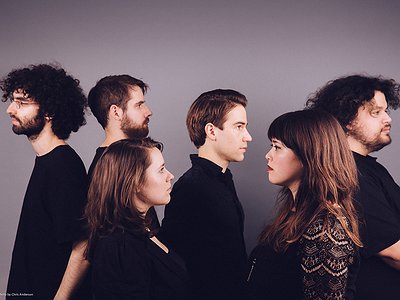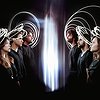Could you take us through a day in your life, from a possible morning routine through to your work? Do you have a fixed schedule? How do music and other aspects of your life feed back into each other - do you separate them or instead try to make them blend seamlessly?
Well, my days are often very different from each other. But I’ll take you through a day where I’m lucky enough to be able to be working on an album all day.
I always make coffee immediately when I wake up. I drink it while practicing whatever foreign language I’m trying to learn, and then I spend a little bit of time reading a book.
Once I get to work, I prefer that the first task of the day be something mixing/production related. I’ll spend half an hour on this to jump start things, before getting into email. I go through my emails and to-do lists and figure out what needs to be done that day, and make a sort of plan of attack. I generally try to get all the non-music stuff out of the way early, as I find that frees up a lot of mental energy for the more creative stuff.
From there I work in two hour chunks, with breaks in between. During these breaks I’ll exercise, meditate, eat etc. Provided that I’m not on a severe time crunch, I like to end work 2-3 hours before I go to bed.
Could you describe your creative process on the basis of a piece or album that's particularly dear to you, please? Where did the ideas come from, how were they transformed in your mind, what did you start with and how do you refine these beginnings into the finished work of art?
I’ll take the song “Terror Bird” as an example. Courtney came up with the basic raw materials of most of the lyrics and melody. She heard some random guitar riff Ben was noodling around with and realized it would be perfect for the song. Then it was a matter of the band arranging it. We realized early on that the bulk of the arrangement would be carried by this idea of contrasting dry, tight sounding verses with these huge lush choruses.
So then as far as making the recording, it was just a matter of getting good performances and using the recording studio to really accentuate this arrangement idea of contrasting big and small. This is easier said than done, but I think we managed to pull it off in the end.
There are many descriptions of the ideal state of mind for being creative. What is it like for you? What supports this ideal state of mind and what are distractions? Are there strategies to enter into this state more easily?
The ideal creative state of mind is a very playful one. There’s just this almost childlike urge to build something and have fun doing it. You lose yourself in the thing you’re creating.
It’s a difficult state to get into, and if I had some magic trick that let you achieve it anytime you wanted I would certainly tell you! I do know that it’s very quickly destroyed by self-consciousness. As soon as you start judging yourself and worrying about how others will perceive what you’re making, that feeling of flow seems to vanish.
I think that fun is a very important component of it. So I’ve been trying to focus on having fun when I’m working.
How is playing live and writing music in the studio connected? What do you achieve and draw from each experience personally? How do you see the relationship between improvisation and composition in this regard?
I think that every composition starts its life as an improvisation of sorts. You could even go so far as to view a composition as a carefully put together collage of improvisations.
The relationship between live performance is interesting, particularly in the way that we approach it in Bent Knee. In our ideal writing process, songs have time to essentially “grow up”, through being played over and over again in front of audiences. There’s something amazingly useful about the instant feedback you get from an audience when you perform in front of them. You can really find out who the song is, in a way that I’ve never quite been able to working with just recordings.
With recording though, you can put a song under the microscope at a level of detail that’s impossible live or in rehearsal. While you get the more holistic view of the song live, in the recording process you can really come to understand the mechanics of how a song works in a way that I find fascinating.
How do you see the relationship between the 'sound' aspects of music and the 'composition' aspects? How do you work with sound and timbre to meet certain production ideas and in which way can certain sounds already take on compositional qualities?
I don’t know if you can actually separate sound and composition, at least in a way that’s not somewhat artificial. I mean it is possible to isolate the components of rhythm, harmony and melody, at least through notation. But in notation they’re stripped of all their context. So I guess you could say sound is what gives composition its context.
In recording, sound is the basic raw material you have to work with. It’s up to the producer to figure out how that sound can be put together in a way to create a desired emotional impact in the listener. When the composer is not the producer, this creates a very interesting collaboration. The producer is limited by the basic composition they have inherited. So they get to figure out what they want to do within limitations that are very defined but at the same time very flexible. It’s difficult no doubt, but when done very well it’s a thing of beauty.
Our sense of hearing shares intriguing connections to other senses. From your experience, what are some of the most inspiring overlaps between different senses - and what do they tell us about the way our senses work? What happens to sound at its outermost borders?
There’s definitely a strong link between sound and visuals. If you close your eyes while listening to music, there’s a very natural response in many people to start visualizing the music. Perhaps this simply relates to the dominance of vision amongst our senses.
More intriguing I think is the link between sound and taste/smell (most of what people consider the sense of taste is actually smell). The fleeting and ever changing impressions that come with taste are not so different from those that come with sound. In fact there is an extremely strong link between producing/recording and cooking. A disproportionate number of producers are also aspiring chefs, and I don’t think this is a coincidence.
Art can be a purpose in its own right, but it can also directly feed back into everyday life, take on a social and political role and lead to more engagement. Can you describe your approach to art and being an artist?
I’ve never had an urge to create overtly political music. For me art is an escape from such things. But naturally, no one is entirely insulated from what is happening in the world. And anything that affects someone who creates art will also affect that art. So whether or not someone is interested in making music about politics, politics will still to some degree seep into their music.
It is remarkable, in a way, that we have arrived in the 21st century with the basic concept of music still intact. Do you have a vision of music, an idea of what music could be beyond its current form?
It seems like the pace of change in music has a strong correlation with the pace of change in technology. Given the likelihood that technology will continue to evolve at an ever increasing pace, this makes predicting the musical trends of even the relatively short term future extremely difficult.
I am very excited to see what the future brings for the art of recording music. People forget how young an art form this is. Not even 150 years old. We’re still in our infancy.



